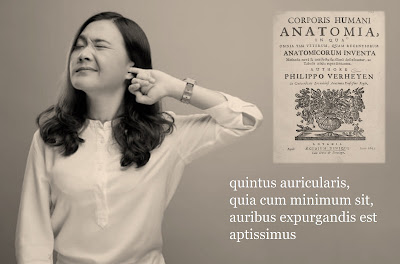[iv] a man’s chin
is covered with a beard, 14. and the eye (in which is the white and the apple)*
with eye-lids, and an eye-brow, 15.│mentum virīle tegitur barbā, 14. oculus
vērō (in quō albūgō & pūpilla) palpæbrīs,** & superciliō, 15.
*pupil (0f the
eye)
**palpebrīs
[v]
the hand being closed is a fist, 17. being open is a palm,
18. in the midst, is the hollow, 19. of the hand. the
extremity is the thumb, 20. with four fingers, the fore-finger,
21. the middle-finger, 22. the ring-finger, 23. and
the little-finger, 24. │ manus contracta, pugnus, 17. est aperta, palma,
18. in mediō vola, 19. extrēmitās, pollex, 20. cum quat(t)uor digitīs, indice,
21. mediō, 22. annulārī, 23. & auriculārī, 24.
[vi] In every one
are three joynts, a. b. c. and as many knuckles, d. e.
f. with a Nail, 25. │ In quōlibet sunt
articulī trēs, a. b. c. & totidem Condylī, d. e. f.
cum Ungue, 25.
vocabulary
virilis, -e [3]:
manly, masculine
tegō, -ere, tēxī,
tēctus [3]: [i] cover, clothe; [ii] conceal; protect
passive: mentum
virile tegitur barbā │ a man’s chin is covered by a beard
albūgō, albūginis
[3/f]: interesting that this is used to refer to the white of the eye because
several dictionaries define it specifically as a disease of the eye (leucoma) or
a white spot on the eye but, unsurprisingly in a work from the 17th
century, there are at times different interpretations of words
contrahō, -ere,
-trāxī, -tractus [3]: draw together
aperiō, -īre,
aperuī, apertus [4]: open
perfect passive
participles used as adjectives:
manus contracta │
a closed hand; a hand (that has been) closed
manus aperta │ an
open(ed) hand; a hand (that has been) opened
quī¦libet,
quaelibet, quodlibet: anyone; whatever, whichever, no matter, what you please;
any whatever i.e. (from the text) the same number of joints in any of the
fingers
totidem
(indeclinable): just as many
[a] vocabulary
from [iv], [v] and [vi]: fill in the blanks with the genitive singular endings
listed below; some of the endings are used several times
articulus,
articul__ [2/m]: joint (a point connecting different body parts)
condylus, condyl__
[2/m]: knuckle
palma, palm__
[1/f]: palm (of the hand); also used to refer to the tree
palpebra,
palpebr__ [1/f]: eye-lid
pollex, poll__is
[3/m]: thumb; big toe
pugnus, pugn__
[2/m]: fist
pūpilla, pūpill __
[1/f]: pupil (of the eye)
supercilium,
supercili__ [2/n]: eyebrow
unguis, ungu__
[3/m]: finger nail; toe nail
vola, vol__ [1/f]:
the “hollow” of the hand; palm
-ae; -ī; -ic-; -is
[b]
[i] pollex,
pollicis [3/m]: thumb
[ii] index,
indicis [3m/f]: index finger; the English noun still retains the Latin plural
i.e. indices
also: digitus salūtāris
from salūs, salūtis [3/f]: [i] safety; security, [ii] greeting; reason for its
use is unclear, one suggestion being that the finger was used in some style of
greeting
[iii] digitus medius:
middle finger
[iv] digitus annulāris
(Mediaeval) from CL ānulāris, -e: relating to the signet-ring < ānulus,
-ī [2/m]: (signet) ring
[v] Good advice
from 17th century health care professionals …
digitus auriculāris:
Why is it called the ear finger?
The term was once
used by anatomists to refer to the fifth finger i.e. the ‘pinky’ or ‘little
finger’
quintus auricularis, quia
cum minimum sit, auribus expurgandis est aptissimus │ the fifth (finger,
called) auricularis, because of how small it is, is most suitable to
clean the ears
Vanheyen: Corporis
Humani Anatomiae Liber Primus (1693)
https://www.clinicalanatomy.c om/mtd/573-digitus-auricularis
[c]
Explain the origin of these English derivatives:
































